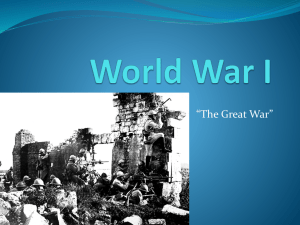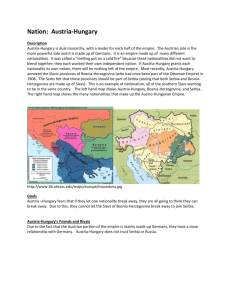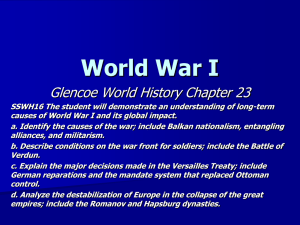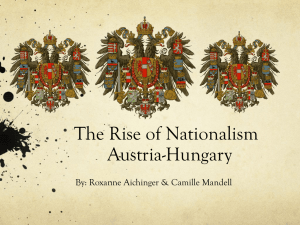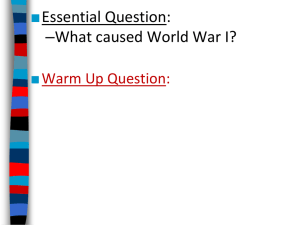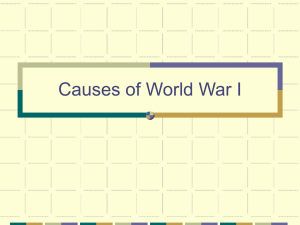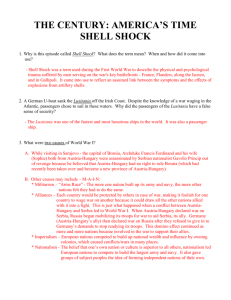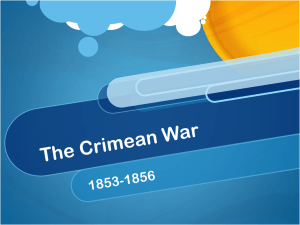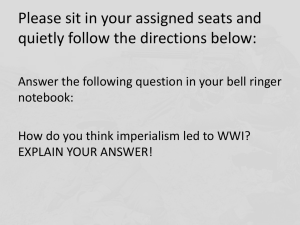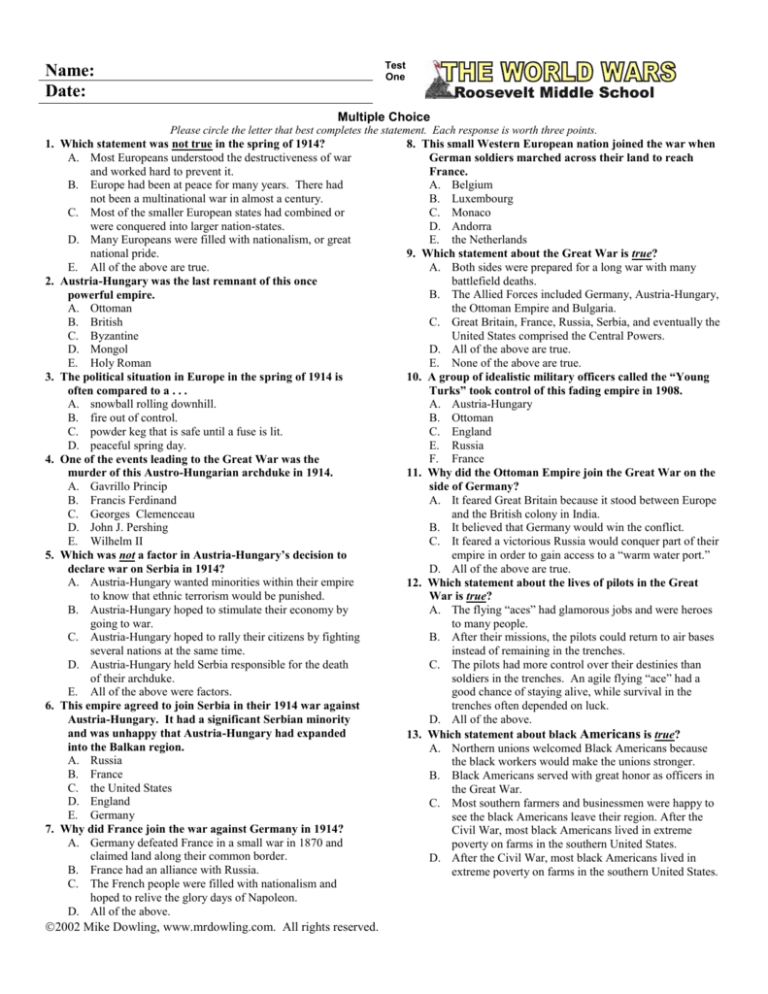
Test
One
Name:
Date:
Multiple Choice
Please circle the letter that best completes the statement. Each response is worth three points.
1. Which statement was not true in the spring of 1914?
A. Most Europeans understood the destructiveness of war
and worked hard to prevent it.
B. Europe had been at peace for many years. There had
not been a multinational war in almost a century.
C. Most of the smaller European states had combined or
were conquered into larger nation-states.
D. Many Europeans were filled with nationalism, or great
national pride.
E. All of the above are true.
2. Austria-Hungary was the last remnant of this once
powerful empire.
A. Ottoman
B. British
C. Byzantine
D. Mongol
E. Holy Roman
3. The political situation in Europe in the spring of 1914 is
often compared to a . . .
A. snowball rolling downhill.
B. fire out of control.
C. powder keg that is safe until a fuse is lit.
D. peaceful spring day.
4. One of the events leading to the Great War was the
murder of this Austro-Hungarian archduke in 1914.
A. Gavrillo Princip
B. Francis Ferdinand
C. Georges Clemenceau
D. John J. Pershing
E. Wilhelm II
5. Which was not a factor in Austria-Hungary’s decision to
declare war on Serbia in 1914?
A. Austria-Hungary wanted minorities within their empire
to know that ethnic terrorism would be punished.
B. Austria-Hungary hoped to stimulate their economy by
going to war.
C. Austria-Hungary hoped to rally their citizens by fighting
several nations at the same time.
D. Austria-Hungary held Serbia responsible for the death
of their archduke.
E. All of the above were factors.
6. This empire agreed to join Serbia in their 1914 war against
Austria-Hungary. It had a significant Serbian minority
and was unhappy that Austria-Hungary had expanded
into the Balkan region.
A. Russia
B. France
C. the United States
D. England
E. Germany
7. Why did France join the war against Germany in 1914?
A. Germany defeated France in a small war in 1870 and
claimed land along their common border.
B. France had an alliance with Russia.
C. The French people were filled with nationalism and
hoped to relive the glory days of Napoleon.
D. All of the above.
2002 Mike Dowling, www.mrdowling.com. All rights reserved.
8. This small Western European nation joined the war when
German soldiers marched across their land to reach
France.
A. Belgium
B. Luxembourg
C. Monaco
D. Andorra
E. the Netherlands
9. Which statement about the Great War is true?
A. Both sides were prepared for a long war with many
battlefield deaths.
B. The Allied Forces included Germany, Austria-Hungary,
the Ottoman Empire and Bulgaria.
C. Great Britain, France, Russia, Serbia, and eventually the
United States comprised the Central Powers.
D. All of the above are true.
E. None of the above are true.
10. A group of idealistic military officers called the “Young
Turks” took control of this fading empire in 1908.
A. Austria-Hungary
B. Ottoman
C. England
E. Russia
F. France
11. Why did the Ottoman Empire join the Great War on the
side of Germany?
A. It feared Great Britain because it stood between Europe
and the British colony in India.
B. It believed that Germany would win the conflict.
C. It feared a victorious Russia would conquer part of their
empire in order to gain access to a “warm water port.”
D. All of the above are true.
12. Which statement about the lives of pilots in the Great
War is true?
A. The flying “aces” had glamorous jobs and were heroes
to many people.
B. After their missions, the pilots could return to air bases
instead of remaining in the trenches.
C. The pilots had more control over their destinies than
soldiers in the trenches. An agile flying “ace” had a
good chance of staying alive, while survival in the
trenches often depended on luck.
D. All of the above.
13. Which statement about black Americans is true?
A. Northern unions welcomed Black Americans because
the black workers would make the unions stronger.
B. Black Americans served with great honor as officers in
the Great War.
C. Most southern farmers and businessmen were happy to
see the black Americans leave their region. After the
Civil War, most black Americans lived in extreme
poverty on farms in the southern United States.
D. After the Civil War, most black Americans lived in
extreme poverty on farms in the southern United States.
14. This nation was the first to leave the Great War in 1917
when a civil war within their nation forced their leader to
leave power.
A. Russia
B. France
C. Germany
D. Belgium
E. Serbia
15. Which statement about America and the early stages of
the Great War is false?
A. Woodrow Wilson wanted America to attain greatness by
winning the Great War. He ran for reelection in 1916
with the slogan, “He’ll lead us to victory in war!”
B. The United States included many people of English,
French, and German ancestry, so it was difficult to
choose sides.
C. The American people had strong feelings of
isolationism, believing they should not become
entangled in foreign wars.
16. Which was not a factor in the entry of the United States
in the Great War?
A. The Americans learned that Germany promised to return
Texas, New Mexico and Arizona to Mexico if Mexico
joined the war effort against the United States and
Germany won the war.
B. Many Americans were outraged when a German
submarine sunk the British ocean liner Lusitania.
C. Woodrow Wilson made a pledge before Congress to
make the world “safe for democracy.”
D. The United States had an alliance with Germany.
17. When the American soldiers reached Paris on July 4,
1917, an American officer announced in French,
Lafayette, we are here! What did that mean?
A. The American soldiers were ready to attack the forces
on the other side of the Lafayette River.
B. The Americans were ready to repay the French for
General Lafayette’s assistance to George Washington in
the American Revolution.
C. The American forces were ready to fight alongside the
forces of the Marquis de Lafayette, the leader of the
French army in the Great War.
18. The American forces were ready to take on the army of
General Lafayette.Who were the doughboys?
A. The rich American bankers who made whose financial
contributions made victory possible in the Great War.
B. The farmers who grew extra crops in order to feed the
American soldiers fighting in Europe in the Great War..
C. Americans of all ages who sacrificed and ate less in
order to support the American soldiers in the Great War.
D. The American soldiers fighting in Europe in the Great
War.
19. Which statement about the consequences of the Ottoman
Empire leaving the Great War is false?
A. The British took control of Mesopotamia.
B. The empire was whittled down to the approximate
present day borders of Turkey.
C. Mustafa Kemal took control of the nation and began a
modernization program designed to keep the Western
Powers from attacking in the future.
D. All of the above.
20. Czechoslovakia, Poland, Yugoslavia, and Romania were
independent nations carved from this former empire at
the end of the Great War.
A. Russia
B. Germany
C. the Ottoman Empire
D. Austria-Hungary
E. France
21. This nation was the last of the Central Powers to hold out
against the Allies in the Great War.
A. Bulgaria
B. the Ottoman Empire
C. Austria-Hungary
D. Germany
E. None of the above
22. Which statement about the end of the Great War is false?
A. Germany was limited to a small army and was forbidden
to build large ships.
B. The Germans were forced to pay Great Britain and
France for the damage they caused in the Great War.
C. France and Britain followed all of American President
Woodrow Wilson’s advice.
D. Germany was stripped of its overseas colonies and its
coal-rich Saar region.
E. All of the statements are true.
Extended Response
You may write in cursive or manuscript but your work must be very neat. Twelve-point answer will be scored as follows: two points for including a
topic sentence, four points for each valid supporting statement, and two points for including a conclusion.
23. Explain why either Germany, Austria-Hungary or France entered the Great War in 1914.
24. Explain why the Great War was more terrifying than any war that preceded it.
Extended Response: Synthesis
You may write in cursive or manuscript, but your work must be very neat. Each question is worth five points and requires you to think for yourself.
Two points are awarded for a serious effort.
25. George Washington gave a Farewell Address at the end of his presidency in 1796. Washington urged Americans to avoid
alliances with foreign nations. In light of the attacks of September 11, 2001, do you agree or disagree with Washington’s
advice?
26. Do you agree with the opinion of A. Phillip Randolph or that of W.E.B. DuBois regarding participation in the Great War
by Black Americans? In order to earn full credit, you must explain the positions of both men.
2001-2004 Mike Dowling, West Palm Beach, Florida, www.mrdowling.com. All Rights Reserved.

